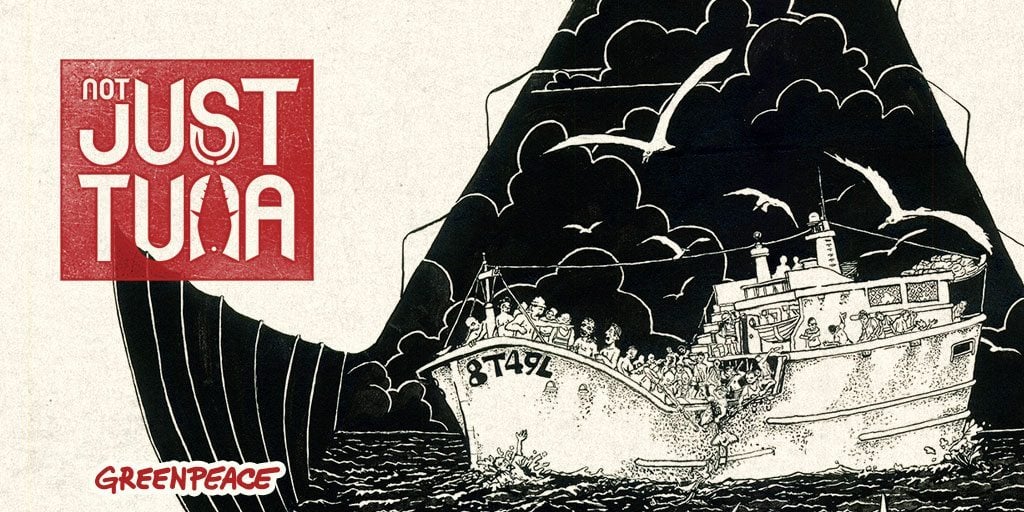The global tuna industry is out of control. It’s emptying our oceans of fish, devastating other marine life and exploiting workers in shocking ways. To fix it, we’re taking the fight to the world’s largest tuna company and it’s number one U.S. brand.

Most cans of tuna on supermarket shelves hold dark secrets: exploited fishermen, dead sharks, and dying oceans.
Workers have reported being beaten, abused and forced to work on ships for months or years at a time. Fishing vessels use methods that wreak havoc on marine life. Tuna is even being stored in the same shipping containers as the dirty fuel the ships use, then sold to consumers.
One of the largest tuna brands in the U.S., Chicken of the Sea, is owned by the world’s largest canned tuna company — Thai Union Group. The stark reality of the industry is clear, but Thai Union Group and Chicken of the Sea are looking the other way. Whatever the company wants to believe, we know from hard-hitting media exposés and our own investigative research that Thai Union is seriously implicated in horrendous human rights and environmental abuses.
The United States is the largest canned tuna market in the world, so consumers and ocean advocates here have a major role to play in making things better.
A Closer Look at Chicken of the Sea
Chicken of the Sea is one of the most destructive canned tuna brands in the United States for both our oceans and industry workers. Chicken of the Sea doesn’t offer a single sustainable and ethical product to U.S. consumers, and its parent company has been repeatedly linked to both human rights and environmental abuses around the world. It’s time for Chicken of the Sea to step up as an industry leader to ensure its products meet the standards it claims to support.
But there is no future for tuna and many who are forced to work in the industry if Thai Union Group and Chicken of the Sea do not clean up their acts.
We need more than unsubstantiated PR statements, we need immediate change on the water. Our oceans, seafood workers and consumers deserve better. That’s why this past Friday we put Thai Union Group and Chicken of the Sea on notice that we are launching a global campaign demanding that they address environmental and labor abuse in their supply chains, and that we will make sure consumers know what they are buying.
Chicken of the Sea and Thai Union Group can become the world’s leader in providing seafood that is sustainably and ethically sourced. Thai Union Group’s size, reach and purchasing power mean the company has both a huge responsibility and is uniquely positioned to drive much-needed change in global tuna fisheries.
Not Just Tuna
What’s good for the oceans is also good for seafood industry workers. Chicken of the Sea must stop hiding behind ineffective policies and commit to offer only sustainable and ethical tuna for its customers. By making simple changes on the water and in its cans, Chicken of the Sea could lead the entire seafood industry towards stricter standards for sustainability and human rights.
Earlier this year, we released our first ever canned tuna shopping guide. Greenpeace has already made progress with leading brands and retailers in major markets, including in the UK and Australia, getting them to clean up their tuna supply chains. Sadly, the major U.S. brands are lagging behind. Now we are up against the world’s largest tuna corporation and its brands around the world. It’s going to take all of us. We know it is worth the fight: when we change Thai Union Group, we will start to change the entire tuna industry.
Chicken of the Sea and Thai Union Group need to take immediate steps to clean up their supply chains. But for that to happen, the company’s management has to feel the pressure from people all over the world — people like you.
Help us put pressure on the world’s largest tuna company and its number one brand. Tell Chicken of the Sea to make some serious changes in its supply chain.

